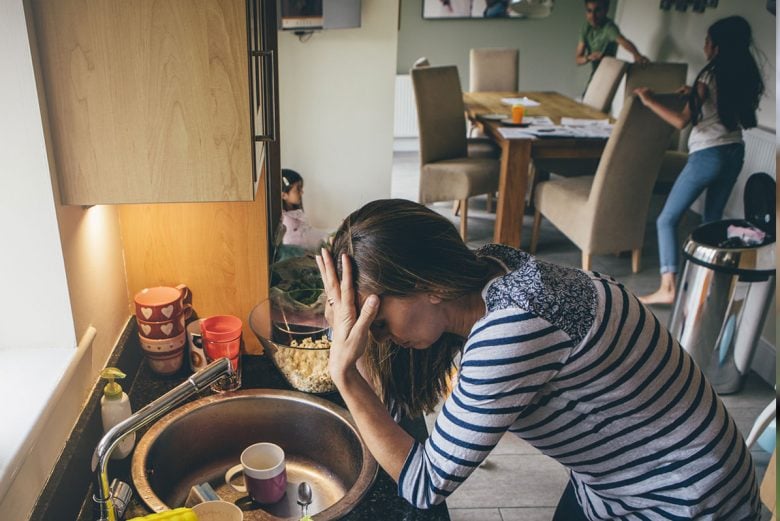
Every parent has their limit. How do you handle yours?
It’s a given that you’ll feel annoyed at your child at some point. But the way you react when you’re annoyed can have long-lasting effects on your children—and not always for the better.
In this episode, Carol and Anne share useful ways to deal with your annoyance without shaming your child. Their insight will help you manage annoyance, from everyday bothers to deeper triggers you need to heal.
This episode’s Parenting Practice
The next time you feel annoyed, ask yourself: What do I need to take care of? Am I hungry? Am I tired? Am I not taking care of myself? Do I need a break? What’s the immediate solution right now? Do I need to set a boundary?
If you notice that deeper issues keep coming up, visit The Carol Tuttle Healing Center and start healing your unresolved emotional patterns, so you can really show up for your kids.
Transcript of podcast episode
Carol: “Ah, just, this is bugging me. You’re bugging me right now.” You ever feel that way, Anne?
Anne: Yeah, definitely. Usually when I’m making dinner.
Carol: Well, it’s the end of the day…
Anne: I’m hungry and you’re like trying to climb on me. and I just need a minute, like, “Get out of here.”
Carol: Welcome to “The Child Whisperer” podcast. I’m your host, Carol Tuttle, author of the best-selling parenting book, “The Child Whisperer.” I’m with my co-host, Anne Tuttle Brown.
It’s reasonable to have your child annoy you at times. It’s a given. They’re going to be…
Anne: You’re living with another human being, right? I think, in general, yeah, anyone you’re living that closely with, it’s fair to know that there will be annoyances.
Carol: Yeah. So today, we’re going to talk about what to do when your child annoys you. So there’s sort of that superficial annoyance, where you’re just tired of dealing with children. And we’re going to look at some of those variables that can set you up to be annoyed easily and things you can fix very quickly. And then there’s the deeper issues of annoyance. So you just really get triggered at a deep level. They bring up some really old stuff and you’re just over-emotionally reactive, whatever kind of emotion it is: anger, sadness, just frustration. But it is not relevant to your child’s influence. It’s something bigger going on that your child represents that’s triggering you into a deeper state of annoyance. So we’ll look at that as well. So let’s take the every day, more, “Ah, just, this is bugging me. You’re bugging me right now.” You ever feel that way, Anne?
Anne: Yeah, definitely. Usually when I’m making dinner.
Carol: Well, it’s the end of the day…
Anne: I’m hungry and you’re like trying to climb on me and I just need a minute, like, “Get out of here.”
Carol: And it’s the end of the day, so you’ve been already parenting all day. So that seems reasonable that you’re going to be less patient or more easily annoyed, we could say. What else are scenarios that…?
Anne: Oh, bedtime when you’re like, “This has gone on long enough,” like, just, “We need to go to bed,” and you’re tired.
Carol: “Just listen to me. Just do what I’m asking, please.”
Anne: Yeah, or that. Or when your child’s movement, I think…and we’ll go over each Type of their movement and what can be annoying, but when it’s just kind of like amplified and you just don’t relate.
Carol: Do you let your children know when you’re annoyed? Do they know? Do you use that as a way for them to stop whatever they’re doing because I think that can be a ploy unconsciously and even consciously by some parents to really let that they are annoyed, that they’re frustrated and annoyed, and now the child better knock it off or change because, you know, you’re causing me to feel annoyed.
Anne: I’ve never said, “You’re annoying me.” There have been times that I was just like, “Stop,” and they’re like, “Why?” And I’m like, “Just stop. I just want to eat my dinner and I don’t want you running around. Like, just stop.”
Carol: Okay. So you’ve never said, “You’re really bugging me right now”?
Anne: No. I’ve thought it, but, yeah.
Carol: Well, good for you. Yeah, no, my point is, it would be best to avoid those references.
Anne: If I did, I’ll tell you what my daughter would say, “Mom, that really hurt my feelings.” And she’d tell me straight up that I shouldn’t say that.
Carol: Good for you and you go on doing a great job teaching her to use her words. There’s very likely some immediate needs you have that you can bring resolution to, so to ask these few questions, “Am I hungry?” Well, you could get something to eat, a healthy snack, drink water. “Am I tired?” Well, you might not be able to fix that immediately. But at least you can know you have less patience and you’re more vulnerable. So you’ve got to…
Anne: Also, I noticed I’m more on edge if like something else in my life is bothering me, if I just read an email or saw something online, where I am…
Carol: You’re processing something else.
Anne: Yeah, I’m like, “Oh, that’s stressing me out.” Like I have a shorter fuse for my kids.
Carol: What else is…
Anne: And I’d be like, “Okay. I’ve got to like separate the two.” I can’t lash out at my kids based on something that’s going on at work or with a friend or something else. A totally different scenario. Yeah.
Carol: Sure. You’re vulnerable. “Do I need a break? Have I been around this child or my children just too much, and I need a break?” So you need to put those into your day. You need to set breaks in your life, you need to set them up. You need to get childcare options.
Anne: Give yourself just a minute and ask yourself those questions, and see if any immediate need can be resolved. And they might just fix it right there.
Carol: Right. And you can always say to your child, “I’m just…”
Anne: I need a minute.
Carol: “Really, I’m tired right now and I am really not feeling my best. It has nothing to do with you.” But you know, I just need to acknowledge what’s going on for me.
Anne: “Why don’t you go sing and dance in the other room, and give me a minute?” Or you know, I think it’s much better to really be that clear. And you don’t need to get into the specifics why you’re not feeling great if you just say, “It’s nothing to do with you,” so they’re not like, “Man, what did I do to bother Mom?”
Carol: Right. The variable there is, you own the energy. You own it. You own that. I don’t depend on my children to read me, so they know where I’m at, “Oh, Mom’s annoyed.” It’s better to just say, “I’m really frustrated right now for other reasons.” And thanks, you own that then, you don’t put that on your children, and the energy is yours to make. And that energy is yours to be accountable for, so your children don’t feel they’re accountable for it. That’s why one of my more popular YouTube videos is “How to not take on other people’s energy.” And I teach in that video, that we all learned as children to have to read our parents energy because they weren’t telling us what was going on and what was really happening with them.
Anne: And you were taking it on.
Carol: Yeah, we’d take it on because energy has to be accounted by someone. And we’ll take on our parents’ energy when we’re young just because we don’t have any other defenses, and we feel like we have to now fix this. Like, “Is it something that I did?” You’re just left uninformed and you’re in this confusion of emotion, and it’s better for a parent just to say, “This is what’s going on for me and I’m choosing to own that. And what would be the most supportive is blah, blah, blah.” But each Type has a tendency that can turn into annoying a parent. For a Type 1, it just could be they’re trying to lighten everything up.
Anne: They’re being goofy, silly…
Carol: Goofy, silly…
Anne: …high movement.
Carol: …high movement…
Anne: Type 2, they could be long-winded, taking a lot of time to make a decision or wanting you, wanting to be near you, wanting to be held by you, and it can just feel like…
Carol: It’ll feel like neediness.
Anne: It can just feel like too much. Yeah.
Carol: Clingy.
Anne: Type 3 will just be in your face, up and down, loud. And Type 4 could be telling everyone what to do or correcting…
Carol: Micromanaging.
Anne: …everything you say or even if they’re in the background and you hear them critiquing commercials. That was something my Type 4 brother did a lot that I found annoying.
Carol: That would bother me, I told him one time. “I know there’s flaws in what they’re doing here. And…”
Anne: “You are right. But I don’t want to…”
Carol: “I just want to sit here and enjoy this experience. So I encourage you to use your critiquing abilities in things that are useful in life, but please don’t share them right now.” And I put a boundary on it, but he was like 17 at the time, and he could handle my very blunt feedback and just say, “Look, I don’t want to hear it.”
Anne: We’ve got more “Child Whisperer” coming up right after this brief message.
Woman: What’s your mom uniform? Yoga pants? Jeans and a T shirt? As a mom, you’re busy, and wardrobe isn’t high on the priority list. But do you ever get tired of feeling blah about how you look? Carol Tuttle’s Dressing Your Truth Program helps you create a personal style that works for you, for your budget, for your family, and for your life. You can look more pulled together in less time, all you need is a little know how, and Carol can show you. Just sign up for a free account at dressingyourtruth.com.
Carol: So what do you do, Anne, if one of your children are annoying you? You know their Type, and they’re playing out their natural tendencies, and they’re going to be stressed too if they read your energy as being stressed. What do you say to them? How do you handle the situation?
Anne: I guess it depends on how hungry or tired I am. In an ideal situation… Well, just this morning, with my Type 2 son, it’s funny, I can just see as he’s getting a little older, really stepping into who he is and the Type 2 movement, he’s very particular about what he wears. He gets himself dressed, and he wants to choose what he wears. We just got some new clothes, and so he’s like investigating and taking his time on what to choose, and I was there like giving a bunch of options, “No, no, no.” And so I was just like, “Okay, I don’t want to take this much time. I’ve got to get other things going this morning.” So I just said, “Why don’t you take the time you need to get dressed. I’m going to leave, and you can make the decision.” So I just exited, but gave him, you know, the support he needed that he could take that time rather than like trying to just, “You’re just going to wear this, it doesn’t matter.” He had the time, I just needed to get moving.
Carol: Did he do it?
Anne: Yeah. And he was really proud of what he chose and he was fine to do it by himself.
Carol: Good. What do you do when your Type 3 daughter is annoying you?
Anne: So with my daughter, it is very much what we described, that in your face, and she’s kind of bouncing all around or like during dinnertime if she’s getting up and down, and I just want everyone to like sit and let’s just eat. Like, “Just give me 10 minutes. It’s like a nice family dinner, can we just sit and eat?” And she’s that classic Type 3, up and down, out of her chair. And so I’ll just set the boundaries clear, like, “You need to sit at the table until this time.” You know, make it fair for her. And then like, in that scenario, where like we’re all staying together, like, I’ll create some boundaries, ask for her to do that. And then if it’s, like, she just wants to have a dance party and have the music on really loud, and I need a moment of quiet, I’ll just invite her to go downstairs or to do it somewhere else, just kind of train redirect rather than shut it down.
Carol: The thing I recall from my childhood, a very distinct feeling of when I’d get disciplined just for being me, and it would trigger my father. So he was easily annoyed by children. What ran through my mind was, “What did I just do? I don’t even know.” Because I was just being me. And that is what you want to avoid with this is, if you’re vulnerable and easily annoyed in certain settings because of those variables that we’ve mentioned previously, and you then respond to your child as though you’re disciplining them to shut them down, to get them to stop doing what they’re doing, and they really weren’t being anything but their natural selves, they’ll wonder, “What did I just do? I don’t even know what I did. I guess it’s not safe to be me. I shouldn’t just be me.”
Anne: And over time, yeah, they’ll shut that down.
Carol: Yeah, that’s the value of The Child Whisperer is that most likely, you still are and you would have very much disciplined children for natural tendencies. Now, it doesn’t fall into, you let a child do whatever they want. That’s not what we’re talking about here.
Anne: No. As I thought through these scenarios, I think of like three different responses that I’ve had. So one, I exit or I invite the child to exit in a supportive and loving way, like I did with Sam in choosing clothes, or Katie, like, “You can listen to music, but it needs to be somewhere else right now.” Or two, I’ll create boundaries and like, “That just can’t happen right now. And this is what needs to happen.” Or number three, I will just go with it and fake it if I need to. Like, for example, this morning, she was playing really loud music. She loves to turn on the music loud while we’re eating breakfast, and I’m just like…
Carol: Well, the other thing…if you have Siri or Echo or any of that in your home, all they have to do is yell out, “Play, da, da, da.” It’s very accessible in our households. You need to get rid of that.
Anne: Well, she was just on her iPad and she was excited to be playing it while we’re getting breakfast ready and, you know…
Carol: What did she play?
Anne: It was like…
Carol: Queen?
Anne: Well, sometimes. Pink. No, it was a Disney playlist this morning. But it was like just getting to me. I’m very sensitive to, like, volume. And so I was tempted to just say, “Turn it off, turn it off, turn off,” but I just went with it for just a little bit longer, just let it play.
Carol: Do you ever put in earplugs?
Anne: I haven’t tried, but I have ever heard that people do that.
Carol: Yeah, I’ve read that on the Child Whisperer Facebook group, that some moms just need to bring it down. Rather than trying to get all the children to bring it down, she just puts in earplugs.
Anne: I have to try that. Yeah, so…
Carol: And it just takes care of it for her. It’s like, when I can’t hear my husband chew food. It really bothers me, especially if we’re having a conversation. It sounds like it’s on loudspeaker, and so rather than tell him, he’s got to go sit somewhere else…
Anne: You go somewhere else.
Carol: …I move myself to give myself a little bit of like… I don’t know why. That’s a thing now, that listening to people chew food.
Anne: And it’s got to be. I’m sure there will be things with your kids, you know. And I like that last one that I shared of like, maybe sometimes you just fake it, and you just give them the benefit of the doubt and, like, just go there with them. And then I think you realize, where do you connect with them, like, in that movement, in their nature? And, like, create scenarios where you can join in the fun or, in Katie’s case, like, go in big with her and having a dance party and creating a moment where we can experience that together.
Carol: Or you let the other parent be the one that carries that for you really. It’s okay…
Anne: If you never go there.
Carol: …that you’re not that parent all the time. You know, it’s like her dad can meet her there instantly, instantly, no effort.
Anne: Yes, he does.
Carol: I can meet her there instantly, no effort, because I match her energy. And so, it’s okay to never be able to fully match your child’s energy. That’s an unreasonable expectation, in my opinion. But meeting it with understanding and support is very different than joining in with it.
Anne: Yeah, that’s a good differentiation.
Carol: The bigger issue of being annoyed is getting deeply triggered, which is a bigger issue that you need to own because if you’re overreacting, and you’re not able to maintain your composure in the settings where there’s no good scenario that you can say, “That situation deserved that overreaction response where I was screaming at my kids.” There’s never ever a time that’s appropriate.
Anne: So there’s some history there. Is that what you’re saying?
Carol: Yeah, you know, it’s never okay to lose your temper and just go ballistic on your children. It’s not okay. Or to make them read your sadness and depression, and that you’re just this glum, solemn person a good bulk of the time.
Anne: So what’s triggering that reaction?
Carol: Old stuff that you need to heal, and you’re vulnerable.
Anne: So, for example, if you’re…
Carol: That was one of my red flags, being a stay-at-home mom in the earliest years, when you were all 6 and under, I was being triggered right and left. I didn’t have control over my environment anymore, and I recognized that, apparently, I need to control my environment, so I don’t feel emotionally out of control. And it started to bring up a lot, a lot of stuff and I enrolled myself in therapy. That’s when I saw, something’s going on here that I need to…
Anne: That’s bigger than this.
Carol: That’s bigger than this because this isn’t fair to my kids. And that’s when…Jenny was 6 and I put myself in talk therapy and just said, “I’ve got to find out what’s going on with me because this isn’t fair to my kids,” which then ultimately, put me on this path in becoming a healer and a teacher of healing. And so that’s a parent’s opportunity and in my opinion, responsibility to get to the deeper issues, so that your children aren’t the brunt of your unresolved emotional pain that’s really about your early childhood and through your teens.
Anne: Or past relationship. Like, if you have a Type 1 parent and their Type 4 child’s really bugging them because they’re critiquing everything like, that could be an old scenario where the Type 1 parent had a Type 4 parent, and that was being played out there, and it’s…
Carol: A child of your same Type can trigger you because you’re at odds with who you are. You’ve not fully accepted it.
Anne: Yeah, we’ve seen that.
Carol: Yeah, we’ve seen that a lot. And so the easiest go-to in helping you with that is,The Carol Tuttle Healing Center at healwithcarol.com because I’ve got multiple, multiple resources in there to make it easy to clean this stuff up. And the reward is great. To free yourself up so that you’re present with your children and your emotionally mature enough to be able to handle every scenario with a reasonable perspective and a place of being centered and not be this unpredictable parent when it comes to your emotional response is a huge value and gift to your children.
You know, that was my big… I didn’t want to be my mother and father, and how they dealt with life and their parenting, it was very unhealthy. I had, you know, one parent that’s a doormat, that never spoke up and was really honest about anything. And another parent that was the other extreme, overreacted horribly. But there was no…you couldn’t trust your parents, you know.
You want your children to know they’re safe with you. And the fact that your daughter can say to you, “That really hurt my feelings, Mom,” that’s incredible. I mean, that says, “I did a good job teaching you to say…” Children need to feel safe, and they need to know they can say whatever is going on without being the brunt of your emotional stuff. And so you got to take accountability for any emotional overreacting that’s going on. And guaranteed, we live in a time where just basically, the energy of this planet is bringing stuff to the surface. Don’t let your children play the role of triggering you. Get to it on your own.
This week’s parenting practice, for most parents, you’re going to have those everyday annoyances and short stints of being annoyed. Ask those questions when it happens this week. What do I need to take care of? Am I hungry? Am I tired? Am I not taking care of myself? Do I need a break? What’s the immediate solution right here right now? Do I need to set a boundary with my child? What is a healthy solution where there’s no fallout and unnecessary wounding of my children because of my being annoyed?
The deeper issue, get in the Healing Center and start healing those unresolved emotional issues, so you can really show up for your kids. That was my number one motive. I want to show up as a healthy parent for my children. And that’s why I worked so hard those early years to not make my past interfere with my ability to do that.
Thanks for listening. For more support, go to thechildwhisperer.com where you can purchase the book, subscribe to our weekly parenting practice email, and find the transcription and audio of “The Child Whisperer” podcast.
Anne: If you’re listening on iTunes, thank you for leaving a review. If you have a parenting question, please send it to [email protected].



